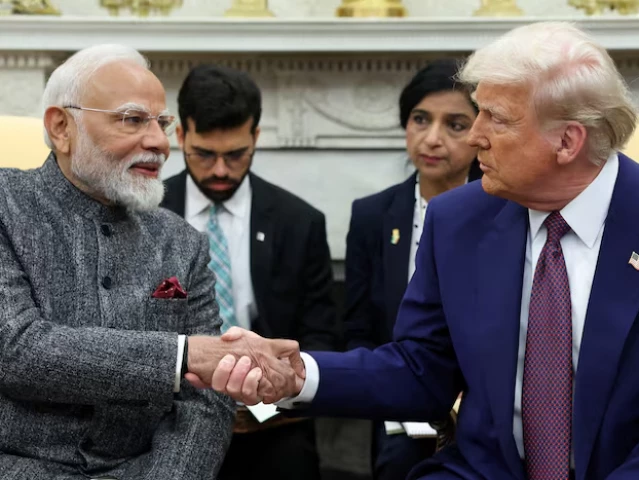Trump again threatens major tariff hike on India in 24 hours
India vows to take all necessary steps to protect its national interests and buy Russian oil amid US tariff threat

US President Donald Trump said Tuesday he was considering "substantially" hiking tariffs on Indian imports in the next 24 hours over the country's purchases of Russian oil.
"India has not been a good trading partner, because they do a lot of business with us, but we don't do business with them. So we settled on 25 percent but I think I'm going to raise that very substantially over the next 24 hours, because they're buying Russian oil," he told CNBC in a televised interview.
In a social media post, Trump wrote, "India is not only buying massive amounts of Russian Oil, they are then, for much of the Oil purchased, selling it on the Open Market for big profits. They don't care how many people in Ukraine are being killed by the Russian War Machine."
"Because of this, I will be substantially raising the Tariff paid by India to the USA," he added.
A spokesperson for India's foreign ministry said in response that India will "take all necessary measures to safeguard its national interests and economic security."
"The targeting of India is unjustified and unreasonable," the spokesperson added.
Read More: 'Trump tariff rates unlikely to change'
Trump has said that from Friday he will impose new sanctions on Russia as well as on countries that buy its energy exports, unless Moscow takes steps to end its 3-1/2 year war with Ukraine, opens new tab. Russian President Vladimir Putin has shown no public sign of altering his stance despite the deadline.
Over the weekend, two Indian government sources told Reuters that India will keep purchasing oil from Russia despite Trump's threats.
India has faced pressure from the West to distance itself from Moscow since Russia invaded Ukraine in early 2022. New Delhi has resisted, citing its longstanding ties with Russia and economic needs, opens new tab.
Trump had already in July announced 25% tariffs on Indian imports, and U.S. officials have cited a range of geopolitical issues standing in the way of a U.S.-India trade accord.
Trump has also cast the wider BRICS group of developing nations as hostile to the United States. Those nations have dismissed his accusation, saying the group promotes the interests of its members and of developing countries at large.
Crude buyer
India is the biggest buyer of seaborne crude from Russia, importing about 1.75 million barrels per day of Russian oil from January to June this year, up 1% from a year ago, according to data provided to Reuters by trade sources.
India began importing oil from Russia because traditional supplies were diverted to Europe after the outbreak of the Ukraine conflict, the Indian spokesperson said, calling it a "necessity compelled by global market situation."
The spokesperson also noted the West's, particularly the European Union's, bilateral trade with Russia: "It is revealing that the very nations criticizing India are themselves indulging in trade with Russia."
Also Read: India's double game with US
Despite the Indian government's defiance, the country's main refiners paused buying Russian oil last week, sources told Reuters. Discounts to other suppliers narrowed after Trump threatened hefty tariffs on countries that make any such purchases.
Indian government officials denied any policy change.
The country's largest refiner, Indian Oil Corp, has bought 7 million barrels of crude from the United States, Canada and the Middle East, four trade sources told Reuters on Monday.
India also has been frustrated by Trump repeatedly taking credit for an India-Pakistan ceasefire that he announced on social media in May, which halted days of hostilities between the nuclear-armed neighbors.
The unpredictability of the Trump administration creates a challenge for Delhi, said Richard Rossow, head of the India program at Washington's Center for Strategic and International Studies.
"India's continued energy and defense purchases from Russia presents a larger challenge, where India does not feel it can predict how the Trump administration will approach Russia from month to month," he said.



















COMMENTS
Comments are moderated and generally will be posted if they are on-topic and not abusive.
For more information, please see our Comments FAQ